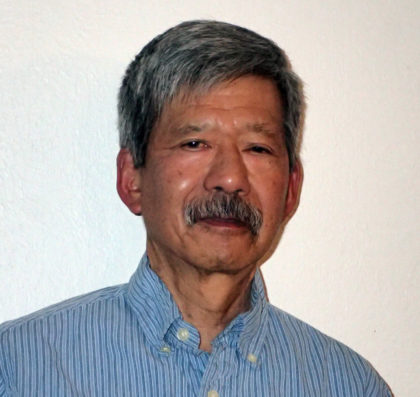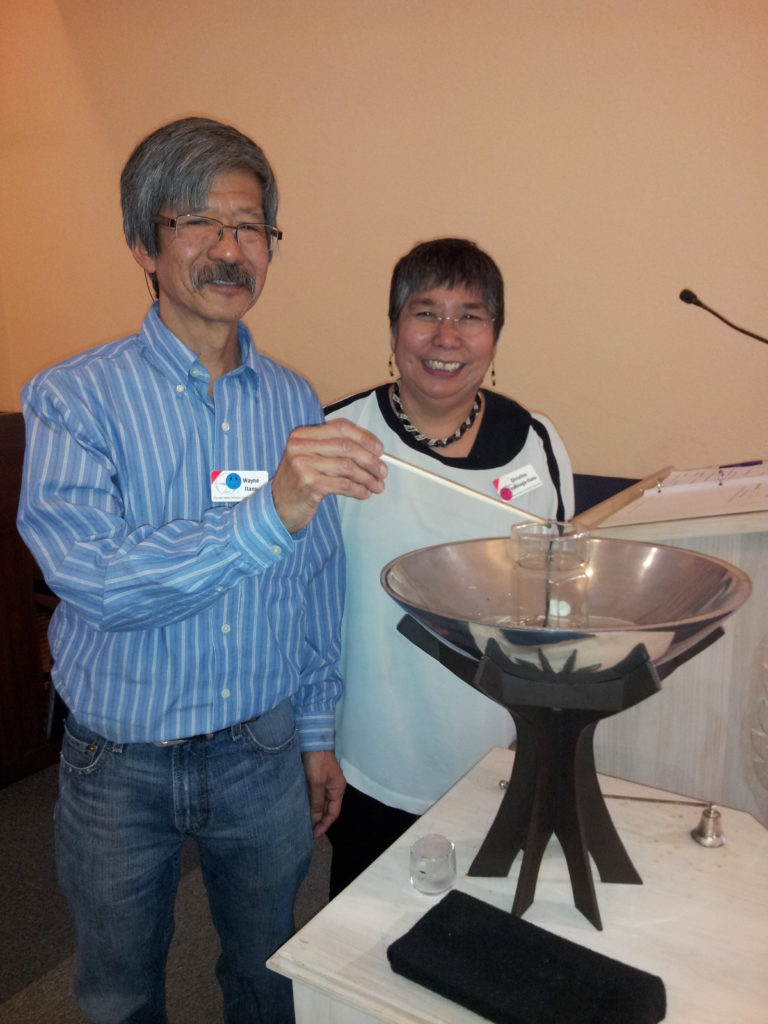Our Stories: Wayne Itano
by Paul Gibb
How many of us know we have a member who has been with the Fellowship for over 30 years, whose parents were both in internment (concentration) camps for Japanese-Americans during World War II, who has degrees from Harvard and Yale, who is a physicist and amateur paleontologist, who has authored or co-authored over 300 articles, and who was on a team the leader of which received a Nobel Prize in Physics in 2012?
Wayne Itano was born on June 1, 1951 in Pasadena. Wayne’s father had moved there to get a Ph.D. in biochemistry under Linus Pauling (a Unitarian and two-time Nobel Prize winner) at Cal Tech. Wayne’s father and mother met when they were both undergraduate students at UC Berkeley, prior to World War II. They married in 1949 while still in Pasadena. In 1954 the family moved to the suburban Washington, DC area where, except for one year in Japan when Wayne was 10, the family stayed until moving back to California in 1970.
The year in Japan was a bit difficult for Wayne and his two younger brothers because, unlike their parents, they had not grown up speaking Japanese. They attended an international English-speaking school, founded by Canadian missionaries. Wayne credits the school with giving him some knowledge of English history, since British textbooks were used, some basic biblical literacy, and a very elementary Japanese language background. Also, he met his Japanese relatives for the first time, and he has tried to maintain contact with them ever since. The family went to Japan by ocean liner and returned home by continuing westward around the world, by plane.
Wayne describes his father as “very reserved and shy, but with an understated sense of humor” and his mother as “very organized and very interested in Japanese culture, especially the arts.” His father liked to take his boys fishing on weekends.
Wayne says he was basically raised Unitarian. His parents had grown up going to Protestant Japanese-American churches but did not attend church services when Wayne was young. Around 1962, when Wayne was 11, the family started regularly attending the Cedar Lane Unitarian Church in Bethesda, Maryland. Wayne speculates that his father might have found out about Unitarianism from his Ph.D. advisor, Linus Pauling.
“If you had to give my theology a name,” Wayne says, “I guess it would be Humanist. But when people talk about Humanism it tends to come out sounding rather negative, what they DON’T believe in rather than what they DO believe in.” If it were possible to be an agnostic, liberal Christian, he might choose that label.
Chris and Wayne met in Denver in 1982, when they were members of a committee that awarded scholarships to graduating Japanese-American high school seniors. The committee meetings were held at the Nisei Post American Legion building, which had a restaurant and bar on the first floor. After one of the meetings, some of the committee members went down to the bar to socialize. Chris was sitting in a booth with some guy that she had been set up with. Wayne and another single, male friend moved into the booth, uninvited. Wayne and Chris immediately hit it off. After a while, the other two guys got up and left – and the rest is history.
Wayne considers himself extremely lucky to have gotten a permanent physicist position at Boulder’s NIST (National Institute for Standards and Technology). He started at NIST (then called the National Bureau of Standards) in 1979 in a temporary position, just after graduating from Harvard with a Ph.D. In 1980 Jimmy Carter, after losing the election to Ronald Reagan, lifted a federal hiring freeze just in time for Wayne to get a permanent position – and only a month before Reagan re-imposed the hiring freeze. Wayne worked on projects involving atomic clocks, quantum computers, and basic tests of quantum mechanics, among other topics. He retired in 2009 but is still a Scientist Emeritus (an unpaid position).
Wayne has another unpaid scientific position as Curator Adjoint at the Natural History Museum of the University of Colorado. This gives him a base to do research on fossils, mainly fossil sharks. He has published several articles in the field and has named three new species and one new genus of fossils.
Wayne and Chris attended the UU Church of Boulder with their two daughters from 1984 to 1987. They moved to the Fellowship after it started an RE program. “I found it a lot more like the UUism I grew up with, more humanist and less earth-centered than at UUCB.”
During his early years with the Fellowship, Wayne’s main involvement was teaching children’s RE, including the Our Whole Lives sexuality program, and helping with the sound system. After retiring, he spent three years as Board Treasurer. He currently serves on the Finance Committee, the Investment Committee, and the Ministerial Formation Team. He also serves as a steward and facilitates one of the Men’s Covenant Groups. In recent years Chris and Wayne have auctioned a Chinese or Japanese dinner. Most years since 1994, Wayne has offered a Boulder geology tour at the auction, making it probably the longest-continuing auction item.
Long distance running has been a major interest for Wayne since 2002, after the younger of his two daughters left home for college. He has run 10 marathons (26.2 miles) and many other races. Two of his marathons were fast enough to make the standard to qualify for the Boston Marathon, but both times there were two many qualifiers for the size of the race, so it was necessary to run about two minutes faster to actually participate in the race – and Wayne was left out.
“I’ve decided I’m a UU for life. And I’m very happy that one of our two daughters attends a UU church in North Carolina with her family.”
Let us all thank Wayne’s father (and maybe also Linus Pauling) for Wayne growing up UU and for coming to the ‘Ship and staying for over 30 years!


